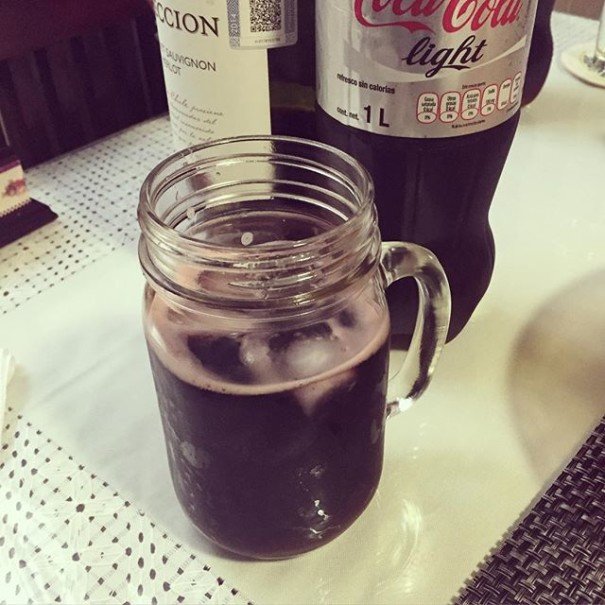
We Young People, We Good‑Time Girls and Boys

We Young People, We Good‑Time Girls and Boys
Calimocho in Madrid
I want to tell you about drinking calimocho, but first—the world being what it is—I have to tell you about the austerity riots. Truth is, I can’t recall the taste of that unfortunate concoction without recalling the circumstances of its consumption, which means the financial crisis and its aftermath, civilization and its discontents; protestors, riot police, tear gas, illegal beer, Early Netherlandish art. Such barricades we build against our memories.
The riots take everyone by surprise. Being a journalist, I suppose I should have been able to read the tea leaves, should have been picking up rumors not yet confirmed and codified in the CIA World Factbook, or whatever, but when I make this trip to Madrid, in September 2012, reporting is the furthest thing from my mind. I’m on vacation. So when the riots engulf the city center, and the attention of the global media swings this way, I do my best to ignore it all. Not easy, given that my hostel on Gran Vía is blocked by protests.
I stick to my itinerary as best I can. Next up: the Museo Thyssen-Bornemisza, a dead baron’s art collection housed in a 19th-century palacio tricked out with marble floors and skylights. I want to see van Eyck’s extraordinary Annunciation diptych, in which the archangel Gabriel and the Virgin Mary are painted to resemble the most delicate marble sculpture, and seem truly three-dimensional, possessing life independent of their wooden panels. A trompe-l’oeil masterpiece.
The protesters, contending with a youth unemployment rate above 50 percent, naturally couldn’t care less about my precious trompe-l’oeil masterpiece.
Outside, on Paseo del Prado, which is lined with police vans, and in Plaza Cánovas del Castillo, massed around the fountain of Neptune, a crowd is shouting, screaming. Brandishing signs that say, simply, NO and “Democracia! No nos representan!” Those who don’t have signs are smoking and drinking, talking on cell phones. There is a giddy anger to the proceedings. Down with austerity. Down with German bitches. Down with the Fourth Reich. It begins to feel like a story by Donald Barthelme. You know the one: We defended the city as best we could. The arrows of the Comanches came in clouds. Only we, evidently, we young people, we good-time girls and boys, out for a drink and a smoke, tourists and madrileños alike, this time we are the Comanches laying siege to our own sick civilization.
It all adds up to a powerful incentive to get gloriously drunk. But young people, broke and jobless, can’t afford to get blotto on bar cocktails. And the one-euro beer that Chinese immigrants sell illegally on street corners is strictly an after-hours beverage: good in an emergency, that’s all. So for the youth of Madrid pregaming becomes the game, or at least the game’s first three quarters. And the drink of choice is calimocho, a mixture of cheap red wine and Coca-Cola.
Hardly enticing, calimocho goes down best in a student apartment, like the one in which I find myself after a chance meeting with a beautiful, slender African-American girl named Brittany and her friend Jonay, a stocky Spaniard. Brittany, a Brown graduate who will soon be starting medical school, plans to spend the next three months immersed in Spanish-language study so as to better communicate with her future patients back in Maryland. Jonay is embarking on his freshman year at Complutense University. Their roommates are Alexis, another young Spanish guy, and Monica, an Italian exchange student.
Jonay, or someone, hefts the box of wine and gives me a generous pour. Cola fizzes down on top, drowns whatever doubtful virtues the wine may have possessed. And just like that I’m back in college: big, red plastic cup in my hand, full of something even the most generous among us couldn’t be moved to call a cocktail. Why, then, am I downing it so readily? As someone who indulges rarely in sugar, still less in caffeine, I now have a triple whammy of mood enhancers coming down on me. The table fills up with empty beer cans and plastic cups.
Meanwhile, our conversation proceeds in a jumble of English, Italian, and Spanish; jokes in three languages, translated and translated again. We fall back on cognate words and hand gestures. At one point, Jonay, who barely speaks three words of English, uses his phone to look up the word for publicidad—advertising—which is what he’s studying.
“Advertising jobs en Nueva York?” he asks, because this is his dream and New York is where I’m from. Yes, of course, I say, silently hoping the next four years improve his language skills.
I’m about to expand on this when the calimocho cuts in, which is to say that a dispute arises over the quantity of alcohol Brittany has vowed to quaff tonight. “Five drinks!” Alexis says. “Five! You promise it!”
Jonay backs him up: Sí, cinco bebidas.
“I meant five drinks, not five full cups,” she protests, looking down at her red cup lately full of wine and cola. A tall, wide cup. “Five cups would kill me.”
“Okay, you might die,” Alexis admits sagely. “But you promise it.”
And we haven’t even hit the town yet.